Audie Blaylock bassist opens up about his bluegrass education and his electric upright
Exclusive interview with FBPO’s Jon Liebman
November 16, 2020
You might say bluegrass bassist Reed Jones has a touch of the maverick to him. Although the musician is seriously dedicated to the traditional bluegrass sound, Jones is not shy about belting out the low notes on his electric upright when he plays with Grammy-nominated artist Audie Blaylock as a member of his band Redline. The bassist is also a devoted coffee aficionado whose love of java was instrumental in getting the group to release its own coffee blend, Redline Roast. In addition to his association with Blaylock, Jones has played guitar with Billie Renee’ & Cumberland Gap, with whom he won the 2006 SPBGMA (Society for the Preservation of Bluegrass Music in America) International Band Championship, and worked with other bluegrass acts, including Unlimited Tradition and Joe Mullins & the Radio Ramblers.
FBPO: Why don’t we start from the beginning? Tell me about your musical upbringing.
Jones: Sure! I was a guitar player first. I started playing guitar when I was about 12. I lived two lives as far as being a musician went. I grew up with family roots in Eastern Kentucky, so I had bluegrass and mountain-style music in the backdrop my entire life. It was always there, but I never played it. I was into more classic rock. I really loved Stevie Ray Vaughan and things like that. And also, just being a product of my generation, I was listening to whatever was popular in the late ’90s and what have you.
FBPO: What made you gravitate to the bass?
Jones: I had all that going on until I hit about age 16, when I finally took one of my family member’s advice, and I listened to a gentleman named Tony Rice, and it just flipped me completely around. I stopped playing electric music and really focused on playing acoustic music. A big part of being a bluegrass musician is that most bluegrass musicians play multiple instruments. About that time, a friend of mine hooked me up with an upright bass. I started playing some electric bass as well, but that was primarily for fun. I picked up the mandolin, I picked up the banjo. Of course, I had the guitar, and then the bass. Eventually what I found out was, as a guitar player in bluegrass, there’s a lot of people that fill that role, but there’s not a lot of people who took bass playing very seriously. If you think traditionally in bluegrass, there were bands that wouldn’t even travel with a bass player early on, and then they would pick up a bass player wherever they went. Oftentimes, when you think of traditional bluegrass, the bass playing role would be relegated to Grandma. We’ll just give her a big bass fiddle and have her stand in the back and act like she’s doing something!
FBPO: The transition from guitar to bass is not as easy or as natural as a lot of people think, but the transition from guitar or even electric bass to upright bass, that’s a whole different animal. How did you go about learning The Beast?
Jones: It was pretty much just sheer force of will. When I was playing, as I started getting more and more into bluegrass, I would say I became more of an upright bass player before I really delved very deeply into the electric bass. If I wanted to learn how to play bass, I had to learn how to play the upright bass. I was so into bluegrass at that time that there really wasn’t much of another option. The weird thing about me as a musician is I’m very much a purist in most every facet of my personality, especially my musicianship. And so it was an interesting phenomenon that I’ve become so taken with playing in the NS Design upright bass.
FBPO: I want to get to that in a minute, but I would assume that, your purest nature notwithstanding, you didn’t go the traditional route in learning the upright bass, with the bow and playing Vivaldi sonatas! Is that an accurate statement?
Jones: That is an accurate statement! I came at it from a bluegrass perspective, which for me as a bass player, I think is a really great place to start because the bass plays such a foundational role, bluegrass not having a drum kit, things of that nature. You’ve got the mandolin that occupies the snare space, and the bass that occupies the space of the kick drum. In bluegrass there’s not a lot of room in the bass playing to be super fancy or to play really outside. It’s very much a roots vibe kind of a thing, with such an emphasis on feel, and time, and groove, and tone.
FBPO: Groove is everything.
Jones: That’s proving grounds for a bass player, in my opinion. When it comes to any bass player, whether it’s electric, or upright, or whatever, I’m not into the flash as much as I am people who really can lay down a serious groove, not be so interested in playing super flashy things. So I felt like bluegrass was a really great way to learn how to play the bass and to approach it. Believe me, there’s always room for embellishment and things of that nature, but I think that the bass’s role is, first and foremost, to be just extremely solid. That word right there for me is a big part of what I think bass playing should be about regardless of musical genre. And so bluegrass, you have to be so solid.
FBPO: That’s such a great point because some people would almost scoff at that, saying “Oh, it’s just one-five, one-five.” Yeah? Well, can you play one-five, one-five and make it feel great? Let me hear the best one-five, one-five you’ve got! People don’t take it seriously often enough.
Jones: Sure!
FBPO: How did your career get rolling. What kind of stuff were you doing initially?
Jones: I got hooked up with a regional bluegrass band that was doing a little bit of traveling around Kentucky in the Southeast called Billie Renee’ & Cumberland Gap. I was the guitar player in her band and I sang harmony with her. Bluegrass is a community and so everybody knows everybody, or you know somebody who knows somebody else. Through the grapevine, I heard that Audie Blaylock was looking for a bass player. This was around 2010. After playing in that regional band for about five years, I reached out to Audie. Didn’t know him from Adam. I just simply sent him a message via Facebook in 2010 and said, “Hey, this here’s who I am.” I sent him some YouTube videos of me playing or whatever, played guitar actually. He hit me back up and said, “Hey, you’re not that far away from me. You’re about two and a half hours. Why don’t you just come up to the house and we’ll play a little bit and we’ll go from there?”
FBPO: Did he want you to play guitar too or just bass?
Jones: No, Audie is the guitar player. But I said, “I know you need a bass player. I also play bass.” I had done some fill-in work with a couple of other bands at that time, just people that needed it, some people who were pretty good pickers. I had sent him a couple of videos of that and he said, “Why don’t you just come up and we’ll try you out on the bass?” I went up and it was literally just he and I.
FBPO: What was that first meeting like?
Jones: I honestly love the story of my audition because it was not at all what you would expect. It was more philosophical than anything else. It was just he and I, and we played one song, and he goes, “Okay, do you want to go listen to music?” But what we were talking about with the “where you put it,” that’s why I pretty much only played one song with him. He was also hiring me to sing harmony in the band. After he said, “You want to go listen to music?” I said, “We should probably sing together, don’t think you think?” He’s like, “Oh yeah, we should do that.” I just remember him making the comment like, “Well, I don’t really need to hear any more,” because for him, rhythm and timing is the most important thing that you can have. You have to have that. There’s a chemistry that has to happen amongst band members. Everybody has to have the same mindset, especially timing-wise and rhythm-wise in bluegrass. And so when he played that one song, and he realized that what he was looking for timing-wise for his sound I had, or was exhibiting while playing with him, he was like, “All right, I’m done. Let’s go listen to music,” and that’s what we did.
FBPO: You mentioned NS Design. When I think of NS Design, the electric uprights, I think of guys like Tony Levin, or Bakithi Kumalo, or Benny Rietveld. Did it surprise you how well that bass works in bluegrass music too?
Jones: Yes and no. What really surprised me about the NS was how it became such a part of the sound that we have a hard time going back to an upright. I got in touch with NS and we started working together in 2011. I had some fly dates and things like that. We were playing out in Arizona and California, and I needed something I could travel with because I thought borrowing an upright was out of the question.
FBPO: You never know what you’re going to get.
Jones: Exactly. I just could not deal with that unknown. I got in touch with them and we started working together. Later that summer, the record label that we were all on was going to do a live performance CD of a number of their artists at Beanblossom in Indiana, which was Bill Monroe’s home festival. It was his day. And so they were going to do this live thing. I’m like, “Sweet! We’re going to do some recording. I’m going to take my King bass. I’m going to play the actual upright.” We played two sets that day. For the first set, I played the King and then I went backstage and was like, “Nope, I have to get the NS out,” because our ear had become so accustomed to hearing what it was putting out, which is not that different, but what it has that it’s hard to accomplish with an upright in a live situation with any consistency is there’s an immediacy to it. There’s no delay. We always say, “It’s like a mallet.” It just smacks you, and you can feel it, and hear it immediately.
FBPO: How else is the NS different from a traditional upright?
Jones: Sometimes the envelope on the notes of an upright, especially when you’re trying to reinforce it through a sound system, can do funky things to your ear and make you wonder exactly, “Where is it?” You can hear it, but it’s like, “Where is this falling on the beat?” I can’t hear when it is. With the NS, I can just hear it, and so the immediacy. I’ve always used foam, I take foam and put it in front of the bridge, underneath the strings to really deaden it and get that thuddy, percussive, almost acoustic sound, so we had gotten so used to that. I’s clean, it’s consistent, it’s punchy. I can dial it up nice and fat, especially now that I’ve started working with Genzler amplification. I’ve been working with them for a year or two now. And man, the combination! It’s really strange because NS Design, they’re known for being very cutting edge with their designs and outside of tradition. Genzler has this bass array thing that’s very out of the ordinary for a bass amp in my experience. So here I am, this purist, playing a traditional form of American folk music, using tools that are completely different than what you would expect from me!
FBPO: What kind of strings do you play?
Jones: I’ve been using D’Addarios. D’Addario makes strings that are specifically designed for the NS and they have two different versions. One is called the modern, and one’s traditional. I play the traditional.
FBPO: That’s what I would have guessed!
Jones: Yeah! Having that string tension is something I need, so I do jack the action up as high as I can get it on my NS Design. I don’t want a nasally kind of a thing in the upper register. I need it to be percussive. I don’t want the sustain to be forever, so I put the foam under the strings. The high action feels more like something I can dig into, like you would on an upright.
FBPO: Man, you like to work, don’t you!
Jones: I do! With any instrument, if I’m not working a little bit, I don’t feel like I’m playing. We like to play aggressively. Audie always says, “We play bluegrass, but we play it like rock stars.” You sink your teeth into it. I do like to jack the action up on that thing. I play the more traditionally-focused strings. I’ve used regular upright strings on them, on the NS, and that works really well. But I just find the traditional strings they have are geared more towards what we do and they fit really well. The tension is good. It’s not quite as taut as a regular upright might be, but it’s definitely not like playing an electric bass either.
FBPO: What’s keeping you busy these days, especially during this pandemic?
Jones: COVID has really thrown a wrench into our world. We haven’t played a show since the very end of February. Everything got canceled. What’s been keeping me busy primarily is songwriting. I do a fair amount of songwriting and have written a number of cuts that we’ve had with Audie Blaylock and Redline. I wrote a theme song for a Travel Channel series several years ago. That was a neat experience. I have to find a way to be creative regardless. Not having the creative outlet that exists playing live shows all the time, and running up and down the road with the guys, songwriting is the thing that I can really sink my teeth into by myself when I’m not able to be on the road like we would like to be.
FBPO: What about the future, once the world gets back to normal?
Jones: Well, that’s a great question. I guess I would really love to get back to playing on the road and playing festivals. That’s the first thing. I miss so much right now the camaraderie of traveling together. There’s just something wildly intoxicating about taking your instrument and a bag and jumping in a vehicle of some sort with your bandmates, and just going down the road. Everybody always says, “They don’t pay you to play music. They pay you to get there.” I love that part of it. I love listening to music with the guys. I love philosophizing about it with the guys. I love bouncing ideas off of guys. I’ve missed that. I would love to get back to that. But that being said, I’ve got a few other songs that have come about here as of late that I would love the opportunity to record with Redline. I also play electric guitar in an original rock band, and I’ve stacked up quite a few song ideas for them as well. I just really want to get back to creating more than anything. We also had a pretty exciting partnership with a coffee roaster, and we had our own roast of coffee, and we had done quite a bit with that.
FBPO: You’re from Kentucky. You’re not supposed to make coffee, you’re supposed to make bourbon!
Jones: [Laughs] I don’t! I am a coffee snob. We developed a specific roast of coffee called Redline Roast and we had been selling that and working it. I would make pour-over coffees at the merch table as we’re selling stuff, and we’d sell the coffee. We’d go down, we played (Nashville radio station) WSM a few times. We did the Huckabee TV show.
FBPO: You know Mike’s a bass player, right?
Jones: Yes, yeah.
FBPO: I interviewed him once. The audience didn’t like that too much. They said I should stay out of politics, and they’re right!
Jones: The politics is always a thing. It’s still a cool thing to get to play a national TV show and to do those kinds of things. One thing I would really like to do is get back to Europe and play. I find that the further you get away from the Southeast, and this is not meant to demean anyone, but when you live on the East Coast of the United States, I feel like we get a lot of really good bluegrass bands around. Once you go out West or you go to Europe, where they don’t get top-notch bluegrass all the time, there’s just an appreciation of the music and the level of engagement with the fans.
FBPO: Bluegrass has a big following in Europe?
Jones: There is a fairly big following, yeah.
FBPO: Are you filling stadiums over there?
Jones: [Laughs] No, typically they’ll do like a club circuit and play some festivals because there’s quite a few festivals over there. We played a festival in Craponne, France. It was the largest country music festival outside of the United States in the world. We went and played in front of 20,000 people there at an outdoor festival. I really like playing for people who are super passionate. One thing I love about traveling is meeting the people who are passionate about different things. It seems the further I get away from home, the more passionate people seem to be about the music just because they don’t get it so regularly.
FBPO: What would you be if you weren’t a bass player?
Jones: Probably a writer. I love words. I love the written word. I would love to be a writer of some sort. It’s creative in the same way that being a musician is, but I find that equally as engaging as music. If you read the last paragraph of James Joyce’s The Dead and it doesn’t give you chills, I don’t understand that. The use of language and the rhythm of it is similar to music. The ability to paint pictures in people’s minds and to tug on people’s hearts, to me, it’s very similar to being a musician. I love all kinds of writing, whether it’s songwriting, whether it’s writing prose, or poetry, or things like that. Or—I will throw one other thing out there—be a photographer or videographer. I enjoy making YouTube videos. I enjoy photography. It’s been a hobby of mine for a long time. I know all those things have basically the same thing in common, and that’s that they’re all creative pursuits and a way that you express the way that you see the world. I have a tendency to be a person that lives a lot in my head. I like to think, and I like to perceive, and I like to analyze what’s going on around me and within me. Being a musician, and writing, and being artistic, and with photography and videography it’s a way to do all of that.
See Jon’s blog, with key takeaways from this interview here.
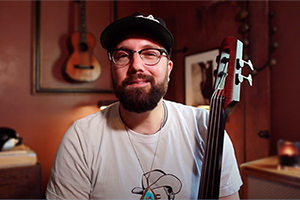
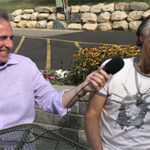
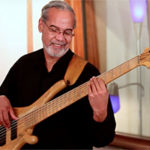
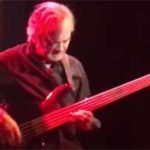

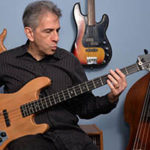

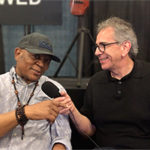
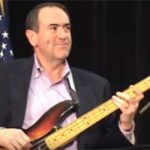

Great interview. Love seeing what Reed is doing. I must say that Reed is quite the musician all the way around!